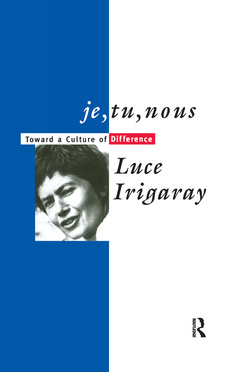Note A Personal Note; Chapter 1 The Neglect of Female Genealogies; Chapter 2 Religious and Civil Myths; Chapter 3 Women's Discourse and Men's Discourse; Chapter 4 On the Maternal Order; Chapter 5 The Culture of Difference; Chapter 6 Writing As a Woman; Chapter 7 “I Won't Get AIDS”1Slogan given to a woman to say during the second campaign against AIDS carried out by French television.; Chapter 8 Linguistic Sexes and Genders; Chapter 9 The Right to Life; Chapter 10 Why Define Sexed Rights?; Chapter 11 “More Women Than Men”1‘Manifesto published by the women's bookshop in Milan—a women's group to which Luisa Muraro belongs—in Sotto¡opra vert, 1985. For further elaboration of the issues and the perspective formulated in this pamphlet, see Sexual Ð??trtnct: A Tbtory ofSocúd-S?mbalic Practice, trans. Patricia Cicogna and Teresa de Lauretis (Bloomington: Indiana University Press, 1990). Originally published as Non credere di avert dti diriîti: L·ßtneraziont della libirtàfe»mttnüí ne¡?tíka e nelle vicende di ?tttßruppo di donne, The Milan Women's Bookstore Collective (Turin: Rosenberg and Sellier, 1987), (Tr.); Chapter 12 Your Health; Chapter 13 How Can We Create Our Beauty?; Chapter 14 How Old Are You?; Chapter 15 The Cost of Words; Chapter 16 So When Are We to Become Women?;




